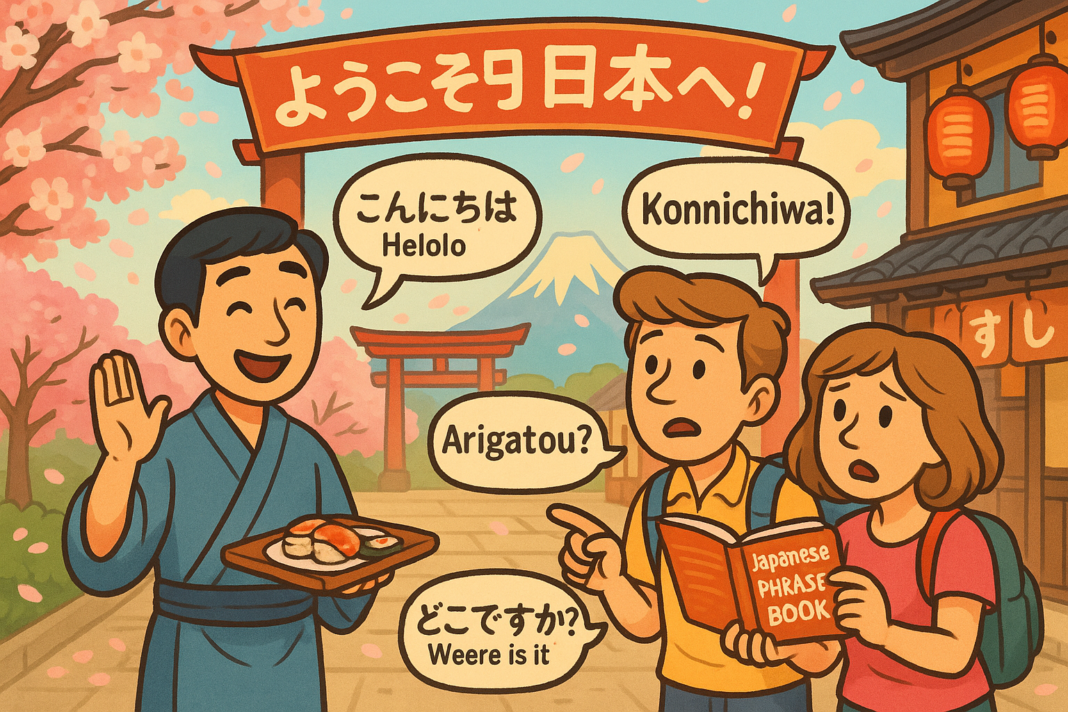“Konnichiwa!” — Hello 👋
If you’re visiting Japan, a few polite Japanese words can transform your experience. From Tokyo’s neon streets to Kyoto’s tranquil temples and Osaka’s ramen stalls, locals deeply appreciate when visitors make an effort to speak their language.
Japanese is built on respect and kindness — even a small Arigatou gozaimasu can earn you a warm smile, better service, or even a friendly bow.
Here are 15 essential Japanese phrases every traveler should learn before exploring Nihon (Japan) 🇯🇵.
👋 1. Konnichiwa (こんにちは) — “Hello / Good afternoon”
Meaning: Friendly greeting used most of the day.
🗣 Example:
Tourist: Konnichiwa!
Local: Konnichiwa! Ogenki desu ka? (Hello! How are you?)
💡 In the morning, say Ohayou gozaimasu (Good morning).
🌅 2. Ohayou gozaimasu (おはようございます) — “Good morning”
🗣 Example:
Tourist: Ohayou gozaimasu!
Local: Ohayou! (Morning!)
💡 Use the shorter Ohayou! with friends.
🌙 3. Konbanwa (こんばんは) — “Good evening”
🗣 Example:
Tourist: Konbanwa!
Local: Konbanwa!
🙏 4. Arigatou / Arigatou gozaimasu (ありがとう / ありがとうございます) — “Thank you / Thank you very much”
🗣 Example:
Waiter: Ramen desu! (Here’s your ramen!)
Tourist: Arigatou gozaimasu!
Waiter: Dou itashimashite (You’re welcome)
💡 Use Arigatou casually, Arigatou gozaimasu politely.
💬 5. Dou itashimashite (どういたしまして) — “You’re welcome”
🗣 Example:
Tourist: Arigatou!
Local: Dou itashimashite!
☕ 6. Onegaishimasu (お願いします) — “Please”
🗣 Example:
Tourist: Kohi onegaishimasu (Coffee, please)
💡 Use it when requesting politely in shops or restaurants.
💴 7. Ikura desu ka? (いくらですか?) — “How much is it?”
🗣 Example:
Tourist: Kore wa ikura desu ka? (How much is this?)
Vendor: Sen en desu (It’s 1,000 yen)
📍 8. Doko desu ka? (どこですか?) — “Where is it?”
🗣 Example:
Tourist: Toire wa doko desu ka? (Where is the toilet?)
Local: Asoko! (Over there!)
💡 Add the noun before doko desu ka?
- Eki wa doko desu ka? (Where is the station?)
- Konbini wa doko desu ka? (Where is the convenience store?)
🚇 9. Eki / Toire / Konbini (駅 / トイレ / コンビニ) — “Station / Toilet / Convenience Store”
🗣 Example:
Tourist: Eki wa doko desu ka?
Local: Sugu soko! (Right there!)
🧾 10. Okanjou onegaishimasu (お勘定お願いします) — “The bill, please”
🗣 Example:
Tourist: Okanjou onegaishimasu.
Waiter: Hai! (Yes!)
💡 In casual cafés, you might just say Check, onegaishimasu.
🍣 11. Oishii! (おいしい!) — “Delicious!”
🗣 Example:
Tourist: Oishii sushi!
Local: Arigatou!
💡 Use it generously — Japanese chefs love hearing it! 🍱
😅 12. Wakarimasen (わかりません) — “I don’t understand”
🗣 Example:
Local: Nihongo dekimasu ka? (Do you speak Japanese?)
Tourist: Wakarimasen!
💡 Say it with a smile — they’ll often switch to English.
🗣 13. Eigo o hanasemasu ka? (英語を話せますか?) — “Do you speak English?”
🗣 Example:
Tourist: Eigo o hanasemasu ka?
Local: Sukoshi (A little)
🚶 14. Sumimasen (すみません) — “Excuse me / Sorry”
🗣 Example 1: Sumimasen! (Excuse me!)
🗣 Example 2: Sumimasen! (Sorry!)
💡 It’s the ultimate polite word — for bumping into someone, getting attention, or thanking extra kindly.
👋 15. Sayonara / Mata ne (さようなら / またね) — “Goodbye / See you later”
🗣 Example:
Tourist: Sayonara!
Local: Mata ne! (See you!)
🧭 Quick Cultural Tips
🌸 Bow slightly when greeting or thanking.
🍱 Never tip — politeness is part of service.
🚉 Queue neatly — order is valued.
🕊 Silence on trains — keep phone on silent (manner mode).
🎎 Respect shoes-off rule — especially in homes and temples.
🌍 Why These Japanese Phrases Matter
✅ Build instant trust and respect
✅ Navigate easily in stations, shops, and restaurants
✅ Show appreciation for Japan’s culture
✅ Turn confusion into connection
Even a simple Konnichiwa or Arigatou can turn a polite nod into a friendly bow 🙇♂️
⚠️ Disclaimer
These phrases are for educational and cultural purposes.
Japanese varies by region — use them politely with a smile.

